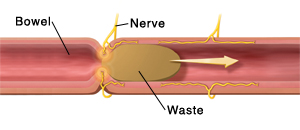Irritable bowel syndrome (IBS) is a disorder of the intestines. It's not a disease, but a group of symptoms caused by changes in the way the intestines work. This includes how they move waste, secrete, absorb nutrients, and convey pain sensations. IBS is fairly common, but the cause is not well understood. There are other conditions that cause symptoms like IBS. Speak with your health care provider to make sure that further evaluation isn't needed.
There are 3 types of IBS:
-
IBS with constipation (IBS-C) is chronic belly pain and constipation.
-
IBS with diarrhea (IBS-D) has recurring bouts of diarrhea with belly pain or discomfort.
-
IBS with mixed bowel habits (IBS-M) has bowel movements that go back and forth between diarrhea and constipation.
Symptoms of IBS include:
-
Belly pain, discomfort, and cramping.
-
Diarrhea.
-
Constipation or dry, hard stools.
-
Stools that contain mucus.
-
Bloating.
-
A feeling of incomplete bowel movements.
Causes
The exact cause of IBS is unknown. It can occur at any age and it is twice common in females as in males. Having a family member with IBS can increase your chances of having IBS.
Home care
The goal of treatment is to control and relieve your symptoms, so you can lead a full and active life. There is no cure for IBS. But it can be managed.
Diet
Your diet did not cause your IBS, but it can affect it. Diet and food choices may cause IBS symptoms in some people, but not everyone. No one diet works for everyone. Finding the best foods for you may take trial and error. Keep a food log to help find what foods made your symptoms worse. Here are some tips that may help you:
-
Eat more slowly. Eat smaller amounts at a time, but more often. You can always eat more, but you can't eat less once you’ve eaten too much.
-
In general, fiber is very helpful for both constipation and diarrhea. However, insoluble fiber can worsen bloating, cramping, and gas. Insoluble fiber can be found in wheat bran, certain vegetables, and whole grains. Soluble fiber is in foods like oat bran, barley, nuts, seeds, bean, lentils, peas, and some fruits and vegetables. Increase fiber slowly and choose a food that includes soluble fiber.
-
Try lactose-free dairy products. Many people are intolerant to lactose.
-
Try cutting out fatty meats and other foods that are high in fat.
-
You can control bloating or passing excess gas. Be careful with “gassy” vegetables and fruits like beans, cabbage, broccoli, and cauliflower. Other foods are called FODMAPs (fermentable oligosaccharides, disaccharides, monosaccharides, and polyols). They are a type of carbohydrate that can cause these symptoms and diarrhea. Some FODMAP examples include honey, apples, pears, nectarines, lima beans, and cabbage. Talk with your health care provider about how to choose low FODMAP foods if you're sensitive to them.
-
Be careful with carbonated beverages and fruit juices. They can make your bloating and diarrhea worse.
-
Caffeine, alcohol, and stimulants can make symptoms worse. These include coffee, tea, sodas, energy drinks, and chocolate.
-
IBS diet guidelines can be confusing. Ask your provider for a referral to a registered dietitian. This professional can help you make sense of IBS diet suggestions.
Lifestyle
-
Look for factors that seem to worsen your symptoms. These include stress and emotions.
-
Although stress does not cause IBS, it may trigger flare-ups. Counseling can help you learn to handle stress. So can self-help measures like exercise, yoga, and meditation.
-
Depression can occur along with IBS. Your health care provider may prescribe antidepressant medicine. This may help with diarrhea, constipation, and cramping, as well as with symptoms of depression.
-
Smoking doesn't cause IBS, but can make the symptoms worse.
Medicines
Your health care provider may prescribe medicines. Take them as directed. For acute flare-ups of your illness, your provider may give you prescription medicines.
-
Check with your provider before taking any medicines for diarrhea.
-
Don't take anti-inflammatory medicines like ibuprofen or naproxen.
-
Long-term medicines can be helpful for chronic symptoms.
-
If you have lost enough weight to make you need nutritional supplements, talk to your provider. This may point to another more serious condition.
Follow-up care
Follow up with your health care provider, or as advised.
When to get medical advice
Call your health care provider right away if:
-
Your belly pain gets worse or does not improve after a bowel movement.
-
You have constant belly pain that moves to the right-lower belly.
-
You can't keep liquids down because of vomiting.
-
You have severe, persistent diarrhea.
-
You have a small amount of blood (red or black color) or mucus in your stool.
-
You have lost a lot of weight.
-
You have extreme thirst.
-
You have a fever of 100.4ºF (38.0ºC) or higher, or as directed by your provider.
Call 911
Call
-
You have a large amount of blood (red or black color) in your stool.
-
You feel very weak, dizzy, or faint.
Featured in


